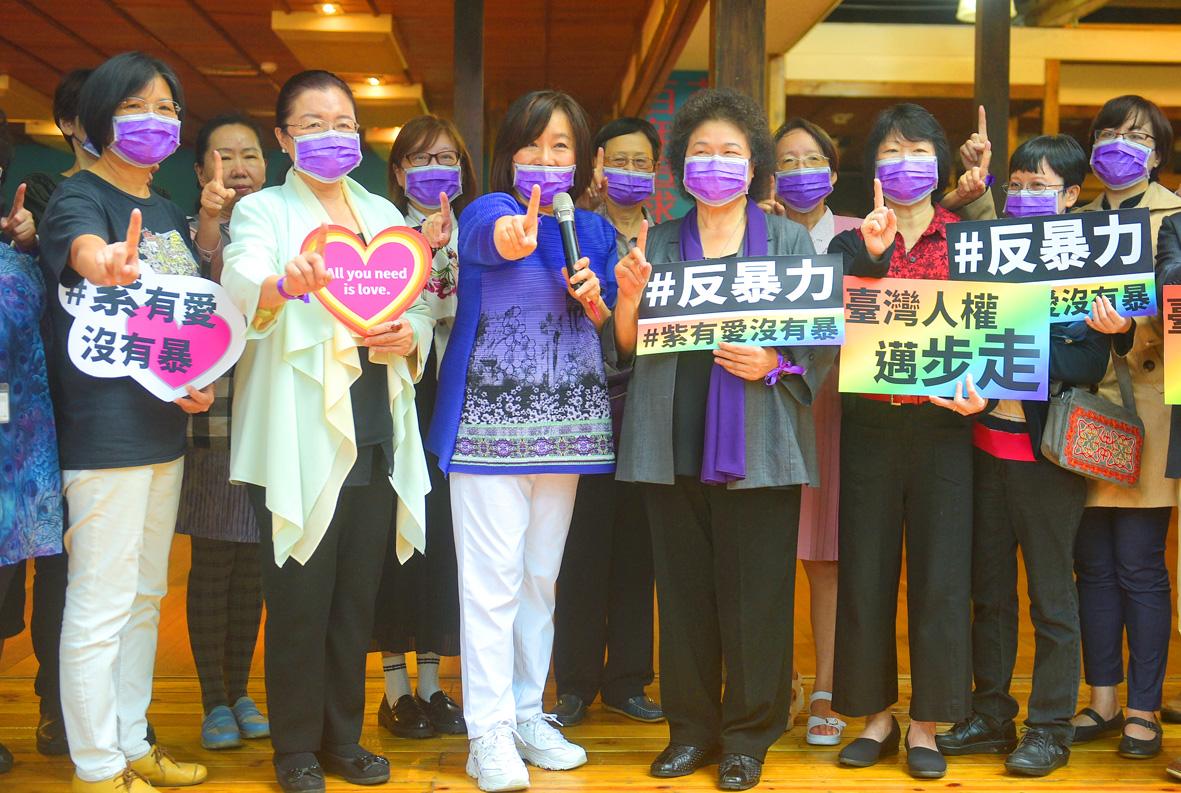The National Human Rights Commission yesterday honored the “mother of Taiwanese modern dance,” Tsai Jui-yueh (蔡瑞月), who was imprisoned by the Chinese Nationalist Party (KMT) regime during the White Terror era.
The commemoration, held at the Tsai Jui-yueh Dance Research Institute in Taipei, comes ahead of the UN’s International Day for the Elimination of Violence Against Women on Wednesday next week.
At the event, Control Yuan President Chen Chu (陳菊), the commission’s chairwoman, talked about Tsai and her husband, Lei Shih-yu (雷石榆), in recalling Taiwan’s democratic transition, during which many people were persecuted and killed.

Photo: Chang Chia-ming, Taipei Times
“We want people to remember the history of the struggle for freedom, so that we can have the will to defend and love our freedom and democracy, which came about only through hard-fought efforts,” Chen said.
A documentary on Tsai’s life was shown at the commemoration, with many in attendance wearing purple ribbons to raise awareness about violence against women.
Tsai’s story has come to represent the victims of the White Terror era, when in 1949 the KMT arrested Lei, an Indonesian-born poet, on suspicion of being a communist agent and deported him to China, separating him from Tsai and their son for more than 40 years, Chen said.
Tsai was also arrested, presumably for maintaining contact with Lei, and incarcerated in Taipei and later for three years on Green Island, Chen said.
Tsai was released in 1953 and founded a dance studio in Taipei, but she and her school were under constant surveillance by the authorities, who disrupted her work and performances, and prevented her from leaving Taiwan.
“Tsai and Lei’s love story lasted through tragic circumstances for many decades, and it has moved many people. It happened because of state violence against a woman,” Chen said.
“We must pursue human rights at all times. It is not possible to reach into every corner to hear every cry for help and sad story. It is up to everyone to be vigilant and strive to listen for the voices of society’s underprivileged, and find ways to help them,” she added.

The Grand Hotel Taipei on Saturday confirmed that its information system had been illegally accessed and expressed its deepest apologies for the concern it has caused its customers, adding that the issue is being investigated by the Ministry of Justice Investigation Bureau. The hotel said that on Tuesday last week, it had discovered an external illegal intrusion into its information system. An initial digital forensic investigation confirmed that parts of the system had been accessed, it said, adding that the possibility that some customer data were stolen and leaked could not be ruled out. The actual scope and content of the affected data

DO THEY BITE IT? Cats have better memories than people might think, but their motivation is based entirely around the chance of getting fed Cats can remember the identity of the people who fed them the day before, Taipei-based veterinarians said on Friday, debunking a popular myth that cats have a short memory. If a stray does not recognize the person who fed them the previous day, it is likely because they are not carrying food and the cat has no reason to recognize them, said Wu Chou Animal Hospital head Chen Chen-huan (陳震寰). “When cats come to a human bearing food, it is coming for the food, not the person,” he said. “The food is the key.” Since the cat’s attention is on the food, it

A New York-based NGO has launched a global initiative to rename the nation’s overseas missions, most of which operate under the name "Taipei," to "Taiwan Representative Office (TRO)," according to a news release. Ming Chiang (江明信), CEO of Hello Taiwan, announced the campaign at a news conference in Berlin on Monday, coinciding with the World Forum held from Monday through Wednesday, the institution stated in the release. Speaking at the event, Democratic Progressive Party Legislator Huang Jie (黃捷) said she believed this renaming campaign would enable the international community to see Taiwan

TOO DANGEROUS: The families agreed to suspend crewed recovery efforts that could put rescuers in danger from volcanic gases and unstable terrain The bodies of two Taiwanese tourists and a Japanese pilot have been located inside a volcanic crater, Japanese authorities said yesterday, nearly a month after a sightseeing helicopter crashed during a flight over southwestern Japan. Drone footage taken at the site showed three bodies near the wreckage of the aircraft inside a crater on Mount Aso in Kumamoto Prefecture, police and fire officials said. The helicopter went missing on Jan. 20 and was later found on a steep slope inside the Nakadake No. 1 Crater, about 50m below the rim. Authorities said that conditions at the site made survival highly unlikely, and ruled